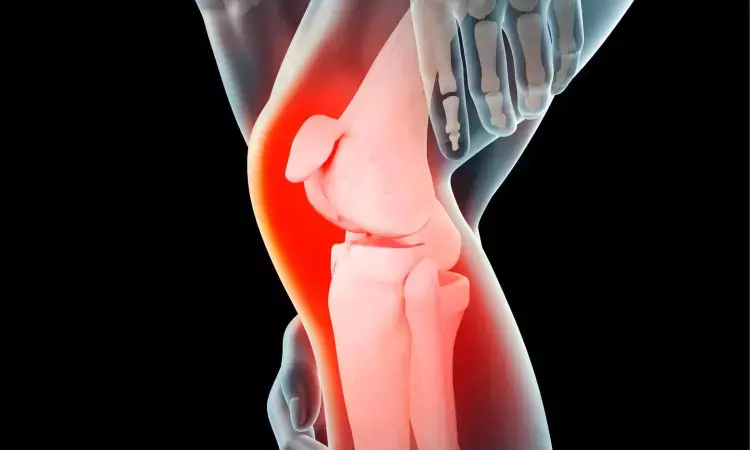- Home
- Medical news & Guidelines
- Anesthesiology
- Cardiology and CTVS
- Critical Care
- Dentistry
- Dermatology
- Diabetes and Endocrinology
- ENT
- Gastroenterology
- Medicine
- Nephrology
- Neurology
- Obstretics-Gynaecology
- Oncology
- Ophthalmology
- Orthopaedics
- Pediatrics-Neonatology
- Psychiatry
- Pulmonology
- Radiology
- Surgery
- Urology
- Laboratory Medicine
- Diet
- Nursing
- Paramedical
- Physiotherapy
- Health news
- Fact Check
- Bone Health Fact Check
- Brain Health Fact Check
- Cancer Related Fact Check
- Child Care Fact Check
- Dental and oral health fact check
- Diabetes and metabolic health fact check
- Diet and Nutrition Fact Check
- Eye and ENT Care Fact Check
- Fitness fact check
- Gut health fact check
- Heart health fact check
- Kidney health fact check
- Medical education fact check
- Men's health fact check
- Respiratory fact check
- Skin and hair care fact check
- Vaccine and Immunization fact check
- Women's health fact check
- AYUSH
- State News
- Andaman and Nicobar Islands
- Andhra Pradesh
- Arunachal Pradesh
- Assam
- Bihar
- Chandigarh
- Chattisgarh
- Dadra and Nagar Haveli
- Daman and Diu
- Delhi
- Goa
- Gujarat
- Haryana
- Himachal Pradesh
- Jammu & Kashmir
- Jharkhand
- Karnataka
- Kerala
- Ladakh
- Lakshadweep
- Madhya Pradesh
- Maharashtra
- Manipur
- Meghalaya
- Mizoram
- Nagaland
- Odisha
- Puducherry
- Punjab
- Rajasthan
- Sikkim
- Tamil Nadu
- Telangana
- Tripura
- Uttar Pradesh
- Uttrakhand
- West Bengal
- Medical Education
- Industry
Outpatient and Inpatient Fast-Track Knee Arthroplasty Show Similar Complication Rates, unravels study

Researchers have found that outpatient and inpatient fast-track total knee arthroplasty (FT TKA) procedures result in comparable complication rates, suggesting that outpatient surgery may be a viable option for many patients without increased risk of early postoperative complications. A recent study was published in The Journal of Arthroplasty by Jean-Yves Jenny and colleagues.
Total knee arthroplasty is a common procedure aimed at relieving pain and restoring function in patients with severe knee arthritis. Traditional inpatient TKA involves several days of hospital stay, but recent advances have led to the development of fast-track protocols, which can significantly shorten recovery time. This study aimed to compare the complication rates and clinical outcomes of propensity-matched patients undergoing FT TKA in outpatient versus inpatient settings.
In this prospective study, 629 patients who underwent FT TKA were followed for 90 days post-surgery. The participants were divided into outpatient (n = 176) and inpatient (n = 462) groups based on consultations between surgeons and patients. Propensity scores based on age, sex, body mass index (BMI), and American Society of Anesthesiologists (ASA) scores were used to match outpatient to inpatient FT TKA in a 1:2 ratio. Complications were categorized into intraoperative complications, complications without readmission, complications with readmission but no reoperation, and complications with reoperation. The cumulative incidence function (CIF) was computed to analyze the time to postoperative complication diagnosis within the first 90 days.
After propensity score matching, 173 outpatients and 316 inpatient FT TKAs were compared.
The study found no significant differences in intraoperative complication rates (2% in both groups).
At the 90-day follow-up, total complications without readmission were 8.0% in outpatients and 7.9% in inpatients.
Complications with readmission but no reoperation were 1.1% for outpatients and 0.6% for inpatients.
Complications requiring reoperation occurred in 4.0% of outpatients and 4.4% of inpatients.
The CIF analysis revealed no significant differences in the timing of postoperative complication diagnosis between the outpatient and inpatient groups.
The findings indicate that outpatient FT TKA is as safe as inpatient FT TKA in terms of 90-day postoperative complication rates, intraoperative complications, readmissions, and reoperations. This supports the growing trend towards outpatient surgical pathways, which can offer benefits such as reduced healthcare costs and improved patient convenience without compromising safety.
This study demonstrates that outpatient FT TKA has similar complication rates and clinical outcomes to inpatient FT TKA, suggesting that outpatient pathways are a safe and effective option for suitable patients. These findings may encourage more surgeons to adopt outpatient FT TKA, potentially leading to broader application and benefits for patients and healthcare systems alike.
Reference:
Jenny, J.-Y., Godet, J., Muller, J. H., Kumble, A., Ramos-Pascual, S., Saffarini, M., Biette, G., Boisrenoult, P., Brochard, D., Brosset, T., Cariven, P., Chouteau, J., Hulet, C., Demey, G., Villeminot, J., & de Ladoucette, A. (2024). Complication rates are not higher after outpatient versus inpatient fast-track total knee arthroplasty: A propensity-matched prospective comparative study. The Journal of Arthroplasty. https://doi.org/10.1016/j.arth.2024.06.006
Dr Riya Dave has completed dentistry from Gujarat University in 2022. She is a dentist and accomplished medical and scientific writer known for her commitment to bridging the gap between clinical expertise and accessible healthcare information. She has been actively involved in writing blogs related to health and wellness.
Dr Kamal Kant Kohli-MBBS, DTCD- a chest specialist with more than 30 years of practice and a flair for writing clinical articles, Dr Kamal Kant Kohli joined Medical Dialogues as a Chief Editor of Medical News. Besides writing articles, as an editor, he proofreads and verifies all the medical content published on Medical Dialogues including those coming from journals, studies,medical conferences,guidelines etc. Email: drkohli@medicaldialogues.in. Contact no. 011-43720751


